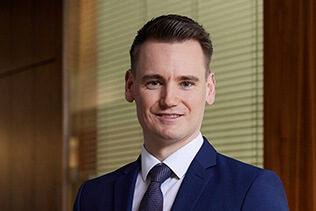Swiss startup Inflammex AG developed specific compounds for treating inflammatory diseases. Last year, Inflammex AG was successfully sold in a multi-billion-dollar deal to a globally operating pharmaceutical company.
From a Serendipitous Finding to Starting a Company
The journey of Inflammex started at a local Swiss university, when two PhD students discovered that an accidentally synthesized side product showed a remarkable decrease in secretion of pro-inflammatory cytokines in initial biological studies.
Encouraged by these first results, further studies were directed towards the optimization of the anti-inflammatory behavior of their initial lead compound. After a first library of compounds has been synthesized, tested and confirmed the initially obtained biological profile, the entrepreneurial spirit of the young PhD students was awakened and they decided to found a new business Inflammex to pursue their vision of providing a novel treatment of inflammatory diseases.
Who owns the intellectual property?
From introductory courses in intellectual property, taken by one of the young founders during grad school, it was immediately clear that a patent application must be filed as soon as possible to protect their invention. First however, the question of ownership of the newly developed compounds arose because the promising results as well as the compounds per se have been produced and developed during their PhD studies. As both students were at that time employed by their university, the invention in fact belonged to the university.
Upon contacting the university’s technology transfer, the university assured them that it would assist in filing a patent application and also bear the costs for the first filing. According to the university’s internal policy, ownership would however remain with the university. Nevertheless, Inflammex would be awarded an exclusive license. Inflammex consulted a patent attorney to assist them in closing a license agreement that is fair to both Inflammex and the university. In particular, Inflammex would be in the lead in prosecuting the IP rights, in particular with respect to geographical protection and would have the option to award sublicenses.
Filing of the Patent
At first, Inflammex filed a Swiss priority founding application, which secured the priority date, i.e. the effective date that is relevant for any prior art for the corresponding patent application. A first filing in Switzerland has the advantage that the official filling fee is relatively low (CHF 200) and furthermore, upon request, a highly professional patentability search can be conducted by the experts at the Swiss Institute of Intellectual Property (IPI), which is even subsidized by the state of Switzerland.
This search revealed relevant prior art documents, which served as a basis for specifically amending the subsequent international application that was filed within 12 months of the day of filing the Swiss application. Thus, Inflammex knew already at a relatively early stage and before investing significant amounts of their funding if they had chances of obtaining a valid patent after a substantive examination.
In addition, in order to minimize the risk of running into problems with existing patents by any competitors, Inflammex further instructed their patent attorneys to perform a Freedom-to-Operate (FTO) search. Therein, the patent attorneys screened the prior art for any patents and patent applications that may potentially be infringed by the developed target compounds. Importantly, as patents generally expire 20 years after their filing date, the FTO searched was limited to the last 20-25 years, while the prior art search performed by the IPI considered all prior art documents. At first, the two founders were shocked, because the FTO search indeed revealed a patent with a claim scope that would potentially be infringed by some of their lead compounds. Gratifyingly however, patent protection only existed in Japan and the patent would expire within the next year, i.e. long before any clinical studies would commence and long before any market entry.
After one year an international application was filed based on the Swiss priority application, which provided Inflammex with a patent application that can be pursued in over 150 countries. Moreover, with the international application in hand, Inflammex could take part in startup competitions which did not only raise additional funds, but also brought them respect and reputation in the community. The international application was further important for securing more funding from new investors, which enabled Inflammex to set up novel facilities on its own, to continue its research and enter into collaborations with larger pharmaceutical companies. Ultimately, after 30 months from the first filling in Switzerland, it was decided to pursue patent protection in Europe, the US and China.
Patents as Leverage for Sale Negotiations
At that point in their career the founders knew they would have to decide whether to continue with their company and try to grow and become a bigger player in the pharmaceutical area or whether they would sell their company and return to their primary interest of searching for new treatment possibilities. The significant financial support required for conducting clinical trials, among other factors, ultimately led them to sell Inflammex together with its intellectual property on the developed anti-inflammatory lead compounds. The broad geographic coverage of their intellectual property portfolio covering the major important markets turned out as a major selling point in the sale negotiations with potential buyers.
While one of Inflammex’ founders stayed with the project within the new owner, the other was intrigued by the possibility to enter a different responsibility as a CSO in a newly founded life science startup.
Take Home Message
Founding a startup company requires a lot of courage, dedication and time investment. Especially within small teams, all members are absorbed by various different tasks and projects. However, securing the intellectual property of your startup is crucial not only for preventing your competitors from exploiting your idea, but also for securing funding. Investors want to secure their revenue, which in most cases is only possible if market exclusivity can be guaranteed.
Consulting a patent attorney already at a very early stage of the entrepreneurial journey is strongly advisable. Our startup team at Rentsch Partner AG offers free initial consultation sessions and specific consulting modules tailored to the needs of a young emerging tech startup.
Please feel free to contact us at any time via our contact form or via This email address is being protected from spambots. You need JavaScript enabled to view it.


